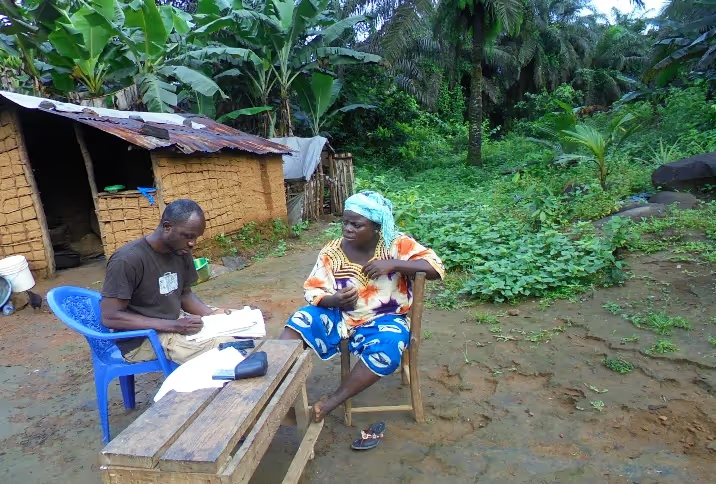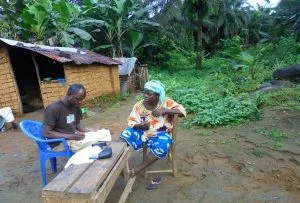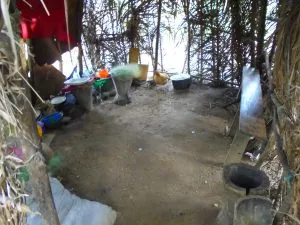Unearthing the antidote for a resilient public health sector in Liberia: Integrating traditional and modern medicine

“While hospitals were closed and Medical Doctors were running away, we were working undercover to save lives during the peak of the Ebola outbreak”.
Public health and other essential sectors in Liberia are being decentralized at a very slow pace. This is evidenced by the lack of accessible and basic health care and infrastructure, particularly for people living in rural Liberia, thus contributing to the reliance on multiple sources of health seeking options including traditional, biomedical, voodoos and spiritual healers. It is now becoming clear that herbalists, traditional and spiritual healers played a major role during the Ebola crisis. As one traditional healer lamented, “Ebola came with all the common illnesses that we have here prior to the outbreak, like headache, vomiting, running stomach pain and rashes… so we, as traditional healers, sometimes do not understand what is Ebola from the everyday sicknesses that we have been treating”- KII, Male TH, Bong County.
Initial analysis from data gathered by our study - a research aimed at understanding the role traditional healers (TH) play in the transmission and mitigation of the Ebola Virus Disease - revealed Liberians not only utilise Western and traditional medicines, but also crave the recognition of traditional healers and the integration of traditional medicines into national health delivery services as a way of building a post-Ebola resilient health care delivery system.
Because the formal health systems are largely operated and managed by government and its international partners, there is a growing perception among THs and service users that biomedical services are deliberately promoted by government in order to suppress traditional practices, promote non- traditional practices and lure financial support from Western donors. While these sentiments were echoed across all the research sites visited, at least the government recognises the deficit in the health sector and the importance for traditional or conventional medicine to complement the gap. In its basic package of health services, Ministry of Health acknowledged that the public facility network continues to neglect the large proportion of the population living more than one hour’s walk from a health facility. Indeed, Abramowitz (2010)[1] observed that traditional health practitioners are often people’s first and last resort for health care because THs render services of various kinds in their communities and regions, especially in places where access to biomedical services is inadequate.
[caption id="attachment_6083" align="alignright" width="300"]

Key Informant Interview with Female Traditional Healer, River Cess County.[/caption]
Traditional healer, Ernest Sheriff, participant in a focus group discussion (FGD), was not exaggerating the magnitude of the challenge when he pointed out “the distance to the health facility we have here is about two 2 hours’ walk, 100 Liberian Dollar (LD) in taxi and it will take you about 30 – 45 minutes before getting there. By motorbike it is 200 LD.” Interestingly, these views are not only held by THs but also expressed by a modern health practitioner. Cephas, a biomedical practitioner, noted “biomedical health facilities and medication in River Cess and Grand Bassa Counties are inadequate to meet the health needs of the people... where you have one health facility in a district, (if a) man has to walk 4-5 hours before he gets to the hospital (that) is dangerous.”
[caption id="attachment_6084" align="alignleft" width="300"]

Health Center of TH, Biafra community, Grand Bassa[/caption]
Undoubtedly, such challenges in accessing the modern health sector could be bridged by better coordination between THs and biomedical services, given the preponderance of evidence that traditional medicines played a key role in the public health domain of Liberia before and after the war. Discourse around collaboration between traditional and modern medicines is gradually gaining currency as policy makers and practitioners are recognizing that collaboration between traditional healers and modern health providers can create complementary systems that are of greater benefit to patients and communities.
Both service users and THs highlighted the need for the two strands of medicines to complement each other in Liberia’s health care delivery system. THs do not see their work in opposition to bio-medicine practitioners rather they believe that they can all work together to save lives and solve health problems.
“I see my work in this community as (being the same as) those of the medical practitioners because they are working to save lives, while I am working to save lives.
Sometimes some of the patients go to the hospital before coming to me,
or sometimes they will come to me and later go the hospital for x–ray which I see as complementing the efforts of both parties.” - KII male TH, Grand Gedeh County.
With the outbreak of the Ebola virus disease, most rural community inhabitants became despondent about the temporary closure of medical facilities and explored alternative health care services. Various respondents informed our teams they used different traditional healers and pharmaceuticals, for either preventive or curative purposes. Meanwhile the study discovered some THs did not heed health warnings but continued to attend to their patients. Traditional Healer Momo Kaidi of Sinjeh, Grand Cape Mount County admitted:
“I was working undercover during the Ebola, when hospitals were closed and doctors were running away during the peak of the Ebola outbreak. I healed so many people. Some of them came with running stomach, vomiting, red eyes and high fever”.
The role of THs remains important in addressing Ebola now and in any future health epidemic because the people within most rural communities we spoke to, believe in them. Their proximity and the respect they enjoy as ‘alternative’ health providers not only makes them critical actors for a resilient health system, but the findings of this study will “play a cardinal role in the advocacy for a lifetime marriage between conventional medicine and traditional medicine, especially from the perspective of Ebola, one of the world’s deadliest diseases ever”, according to Charles Golontaye, President of Traditional Medicine Federation of Liberia.
To make this marriage come to fruition concrete efforts must be made to tackle the aforementioned challenges within the sector, and to address sustainability issues including human resources and finances, training, monitoring and evaluation, and the issue of licensed and unlicensed healers and standardized application of medicines.
[1]Abramowitz, S. 2010. Trauma and humanitarian translation in Liberia: the tale of open mole. Culture, Medicine, and Psychiatry 34.2 (2010): 353-379.
“While hospitals were closed and Medical Doctors were running away, we were working undercover to save lives during the peak of the Ebola outbreak”.
Public health and other essential sectors in Liberia are being decentralized at a very slow pace. This is evidenced by the lack of accessible and basic health care and infrastructure, particularly for people living in rural Liberia, thus contributing to the reliance on multiple sources of health seeking options including traditional, biomedical, voodoos and spiritual healers. It is now becoming clear that herbalists, traditional and spiritual healers played a major role during the Ebola crisis. As one traditional healer lamented, “Ebola came with all the common illnesses that we have here prior to the outbreak, like headache, vomiting, running stomach pain and rashes… so we, as traditional healers, sometimes do not understand what is Ebola from the everyday sicknesses that we have been treating”- KII, Male TH, Bong County.
Initial analysis from data gathered by our study - a research aimed at understanding the role traditional healers (TH) play in the transmission and mitigation of the Ebola Virus Disease - revealed Liberians not only utilise Western and traditional medicines, but also crave the recognition of traditional healers and the integration of traditional medicines into national health delivery services as a way of building a post-Ebola resilient health care delivery system.
Because the formal health systems are largely operated and managed by government and its international partners, there is a growing perception among THs and service users that biomedical services are deliberately promoted by government in order to suppress traditional practices, promote non- traditional practices and lure financial support from Western donors. While these sentiments were echoed across all the research sites visited, at least the government recognises the deficit in the health sector and the importance for traditional or conventional medicine to complement the gap. In its basic package of health services, Ministry of Health acknowledged that the public facility network continues to neglect the large proportion of the population living more than one hour’s walk from a health facility. Indeed, Abramowitz (2010)[1] observed that traditional health practitioners are often people’s first and last resort for health care because THs render services of various kinds in their communities and regions, especially in places where access to biomedical services is inadequate.
[caption id="attachment_6083" align="alignright" width="300"]

Key Informant Interview with Female Traditional Healer, River Cess County.[/caption]
Traditional healer, Ernest Sheriff, participant in a focus group discussion (FGD), was not exaggerating the magnitude of the challenge when he pointed out “the distance to the health facility we have here is about two 2 hours’ walk, 100 Liberian Dollar (LD) in taxi and it will take you about 30 – 45 minutes before getting there. By motorbike it is 200 LD.” Interestingly, these views are not only held by THs but also expressed by a modern health practitioner. Cephas, a biomedical practitioner, noted “biomedical health facilities and medication in River Cess and Grand Bassa Counties are inadequate to meet the health needs of the people... where you have one health facility in a district, (if a) man has to walk 4-5 hours before he gets to the hospital (that) is dangerous.”
[caption id="attachment_6084" align="alignleft" width="300"]

Health Center of TH, Biafra community, Grand Bassa[/caption]
Undoubtedly, such challenges in accessing the modern health sector could be bridged by better coordination between THs and biomedical services, given the preponderance of evidence that traditional medicines played a key role in the public health domain of Liberia before and after the war. Discourse around collaboration between traditional and modern medicines is gradually gaining currency as policy makers and practitioners are recognizing that collaboration between traditional healers and modern health providers can create complementary systems that are of greater benefit to patients and communities.
Both service users and THs highlighted the need for the two strands of medicines to complement each other in Liberia’s health care delivery system. THs do not see their work in opposition to bio-medicine practitioners rather they believe that they can all work together to save lives and solve health problems.
“I see my work in this community as (being the same as) those of the medical practitioners because they are working to save lives, while I am working to save lives.
Sometimes some of the patients go to the hospital before coming to me,
or sometimes they will come to me and later go the hospital for x–ray which I see as complementing the efforts of both parties.” - KII male TH, Grand Gedeh County.
With the outbreak of the Ebola virus disease, most rural community inhabitants became despondent about the temporary closure of medical facilities and explored alternative health care services. Various respondents informed our teams they used different traditional healers and pharmaceuticals, for either preventive or curative purposes. Meanwhile the study discovered some THs did not heed health warnings but continued to attend to their patients. Traditional Healer Momo Kaidi of Sinjeh, Grand Cape Mount County admitted:
“I was working undercover during the Ebola, when hospitals were closed and doctors were running away during the peak of the Ebola outbreak. I healed so many people. Some of them came with running stomach, vomiting, red eyes and high fever”.
The role of THs remains important in addressing Ebola now and in any future health epidemic because the people within most rural communities we spoke to, believe in them. Their proximity and the respect they enjoy as ‘alternative’ health providers not only makes them critical actors for a resilient health system, but the findings of this study will “play a cardinal role in the advocacy for a lifetime marriage between conventional medicine and traditional medicine, especially from the perspective of Ebola, one of the world’s deadliest diseases ever”, according to Charles Golontaye, President of Traditional Medicine Federation of Liberia.
To make this marriage come to fruition concrete efforts must be made to tackle the aforementioned challenges within the sector, and to address sustainability issues including human resources and finances, training, monitoring and evaluation, and the issue of licensed and unlicensed healers and standardized application of medicines.
[1]Abramowitz, S. 2010. Trauma and humanitarian translation in Liberia: the tale of open mole. Culture, Medicine, and Psychiatry 34.2 (2010): 353-379.
Stay updated
Sign up for our newsletter to receive regular updates on resources, news, and insights like this. Don’t miss out on important information that can help you stay informed and engaged.
Related articles


.png)
Explore Elrha
Learn more about our mission, the organisations we support, and the resources we provide to drive research and innovation in humanitarian response.